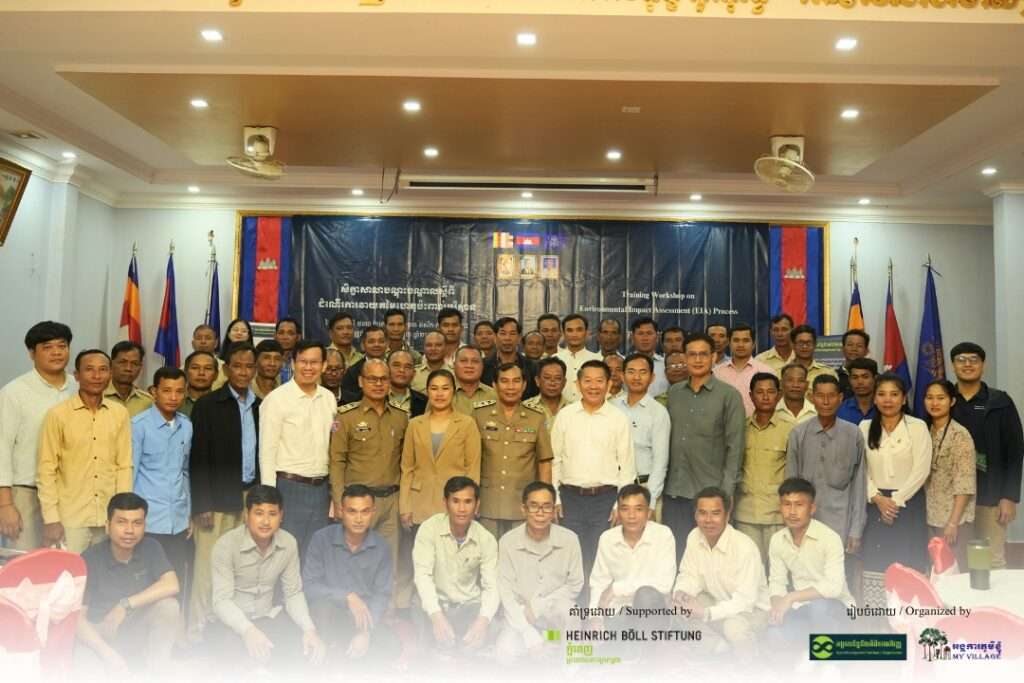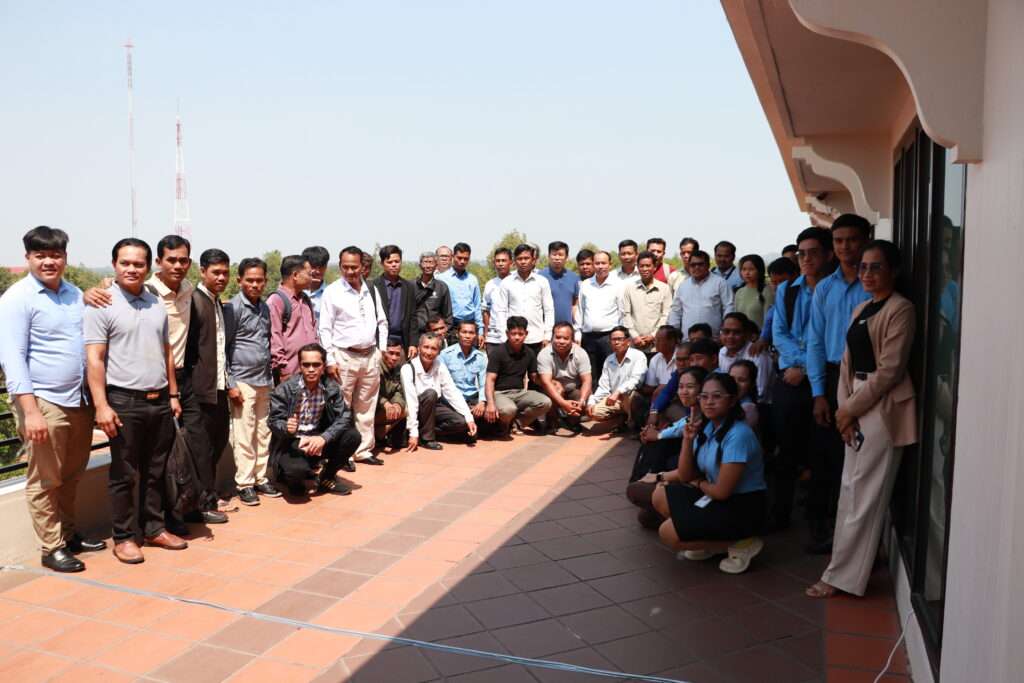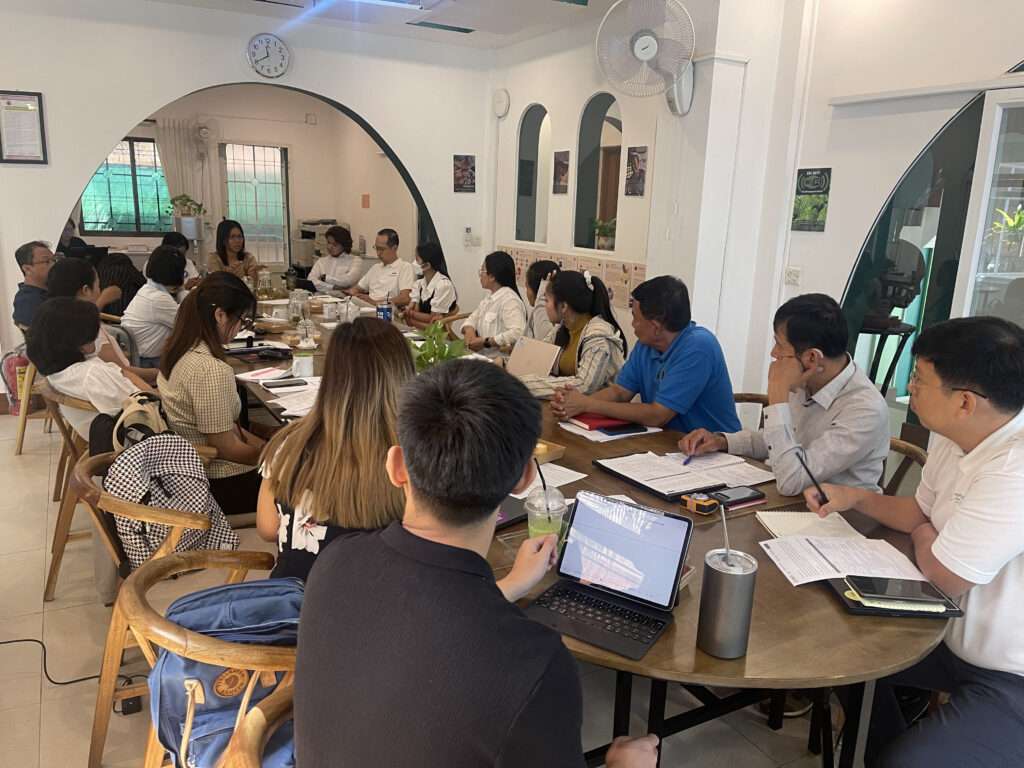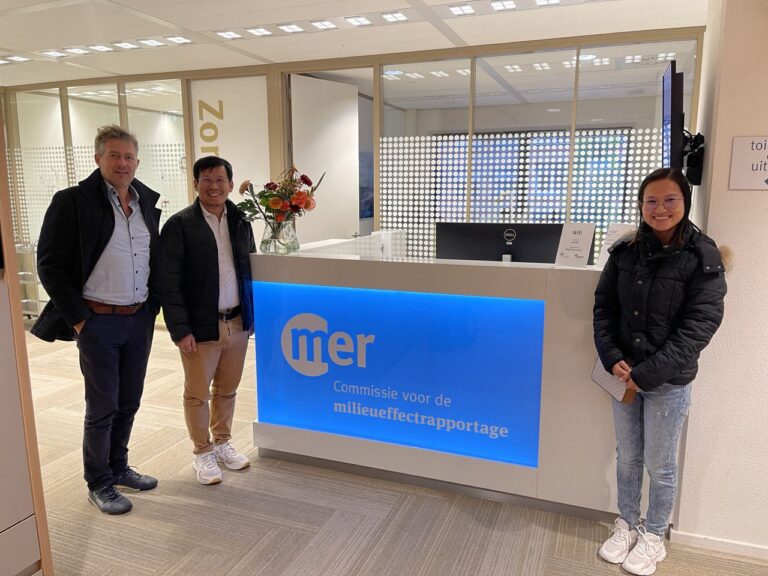Raise awareness of the communities on environmental impact assessment process
On 25 July 2025, Open Development Cambodia Organization (ODC) in collaboration with My Village Cambodia (MVi), under the project \"Enhancing Natural Resource Management Governance through Data-Driven Approaches,\" conducted an important training workshop on environmental impact assessment (EIA) in Mondulkiri province. This event aimed to raise awareness of the local communities and authorities with essential knowledge regarding EIA, fostering informed decision-making and active participation in environmental governance. The workshop gathered 60 participants, including representatives from the EIA Department of the Ministry of Environment, Mondulkiri Provincial Administration, Provincial Department of Environment, Provincial Department of Land Management, Urban Planning, Construction and Cadaster, local authorities, and community members. Despite the technical nature of EIA, the event emphasized the importance of community involvement in the EIA process. Welcoming remarks by Mr. THY Try, Executive Director of ODC Mr. THY Try opened the workshop by highlighting the alignment of the event with the Environment and Natural Resource Code (ENR Code), which mandates comprehensive EIA processes for development projects. He emphasized the critical role of EIA in sustainable development and encouraged participants to be actively involved in discussions, asking questions to extend their understanding and concerns. He also introduced the availability of the EIA and Foreign Investment Mapping (FIM) profile pages on the ODC website, expected to enhance public access to data. Opening remarks by Mr. NGIN Sovimean, Deputy Mondulkiri Provincial Governor Mr. NGIN Sovimean expressed his appreciation to participants and organizers, particularly acknowledging ODC and MVi’s efforts in hosting this event. He highlighted Mondulkiri’s developmental achievements across education, health, tourism, infrastructure, and agriculture sectors, emphasizing the essentials for sustainable development practices. Mr. Sovimean emphasized the province\'s commitment to applying EIA for informed decision-making. Detailed EIA process and legal framework presentation by Mr. CHEA Leng Mr. CHEA Leng, Deputy Director of the EIA Department at the Ministry of Environment, presented a comprehensive overview of the EIA process and its legal framework. He facilitated discussions, encouraging participants to share their experiences and challenges related to EIA. The workshop revealed varying levels of awareness among participants about EIA. Some were well-informed and actively participated in the EIA process, while others were unfamiliar. These discussions highlighted the need for continuous training and better communication regarding EIA, especially in the community. The Q&A session provided valuable insights into the EIA process. Participants raised concerns about specific projects and their impacts on local communities. Mr. CHEA Leng clarified that communities have the right to raise concerns and emphasized the importance of public participation in EIA. He also addressed misunderstandings about EIA delaying development, explaining that it aims to mitigate the environmental and social impact of the development projects. Key issues and community involvement Participants emphasized the need for clear and timely communication about development projects. They raised the community’s challenges including incomplete information, difficulty negotiating compensation for affected communities, limited internet access, and language barriers. They suggested the government improve internet services, ensure information is available in local languages, provide timely meeting notifications, and request more comprehensive documentation from project owners. Addressing these barriers can significantly expand information flow and community involvement and facilitate better decision-making and conflict mitigation. Presentation on the FIM and EIA profile pages by Mr. BAN Chanphalla Mr. BAN Chanphalla highlighted ODC’s role in promoting transparency and accessibility of development-related data through the Foreign Investment Mapping (FIM) and EIA profile pages. The page features key information about foreign investment projects and EIA reports, enhancing public awareness and participation in environmental governance. Closing remarks by Mr. Lonn Pichdara, Executive Director of My Village Cambodia (MVi) Mr. Lonn Pichdara concluded the workshop by thanking all participants and partners. He emphasized the importance of transparent information sharing and the need for further training and support for local communities. Mr. Pichdara recognized the workshop\'s significance in disseminating critical information and fostering stakeholder collaboration.
Civil society’s participation in the draft Land Law dialogue for land rights protection
The Cambodian government has drafted an entirely new Land Law (the draft law), more than 20 years after the promulgation of the 2001 Land Law. Acknowledging the importance of participation from civil society, local communities, and indigenous peoples (IPs), Open Development Cambodia (ODC) formally sought an opportunity to review the draft law and was able to provide constructive inputs based on dialogues with relevant stakeholders. In late January 2024, the Ministry of Land Management, Urban Planning and Construction (MLMUPC) drafted a comprehensive new Land Law, comprising seven titles, thirteen chapters, and a total of one hundred and ninety-nine articles. ODC formally submitted an official letter to the MLMUPC, requesting an opportunity to review and provide constructive inputs on the draft law. The MLMUPC approved the request and shared the draft law with ODC, providing a short window until 16 February 2024 for submitting inputs. Dialogues highlighting key issues such as the need to protect collective rights, in particular, the rights of Indigenous peoples ODC hosted two dialogues on the draft new Land Law – one on 13-14 February in Siem Reap Province and another on 15 February in Phnom Penh. The two dialogues were supported by the United States Agency for International Development (USAID) through Family Health International (FHI 360) under a Cluster Anchor Grant from the Civil Society Support (CSS) Project, ALIGN and LANDESA. During the first dialogue, a Cambodian legal expert presented an analysis of key articles of the draft Land Law to the participants. The participants then discussed and provided their inputs, concerns, and recommendations for the draft law. Representatives from Indigenous peoples’ (IP) communities who were present during the dialogue raised concerns about the limited time provided for comprehending the proposed legal amendments, conveying their understanding to the communities, and gathering inputs from their members. They felt that the dialogue was more of an informative session than a consultative one. As a result, representatives from the indigenous communities were unable to provide their input on the draft law and requested an extension of time for the consultation process. ODC and our partners sympathized with the response from the IP communities, as the timeline for the input was also a huge challenge for the team. The second dialogue was held on 15 February in Phnom Penh, to consolidate the inputs and recommendations derived from the first dialogue in Siem Reap Province. Following the dialogues, ODC and partners prepared and submitted the consolidated inputs and recommendations to the MLMUPC. The document is published on the ODC website, and is publicly accessible. The document highlights several key issues, such as the need to clarify the protection guarantees for collective ownership, right to use, right to enjoy the fruit of the land and rights related to land and other immovable properties of IPs and Buddhist monasteries. The input also requested further consideration towards gender equity and the protection of the rights of IPs and local communities. In early March, ODC attended a meeting hosted by the Land Law Working Group at the MLMUPC. According to the MLMUPC, more than 15 inputs from ODC were incorporated, including issues regarding the classification of public state land and private state land, the timeframe for the registration of communal land titles for IPs, promotion of equity in land rights and land administration, the specification of a timeframe for complaints, a filing process for complaints, and elaboration on the glossary. ODC and our partners shared concerns regarding the time window for the submission of input. The time window for translating the draft law into English and sharing it with our international legal experts, as well as holding dialogues, meant that the input document did not cover all the key points as thoroughly as it could have, if more time were given in the first round. After the input submission, ODC hosted additional discussions and meetings and collaborated with partner organizations to gather more inputs. On 11 March 2024, ODC hosted a knowledge sharing session on Women\'s Rights in Land Ownership and Natural Resource Management (NRM). Additionally, on 22 March 2024, ODC attended a meeting held by the Land Law Working Group of the MLMUPC to discuss the inputs that the working group has received so far. On 26 March 2024, ODC attended another workshop hosted by MLMUPC on the draft law. Then, on 26 April 2024, ODC and partner organizations supported a meeting organized by My Village (MVi) for consultation on the draft law, focusing on the process and challenges of indigenous communal land titling. According to a Ministry officer, MLMUPC will continue to review and incorporate inputs as appropriate and will share a further revised draft law with relevant stakeholders. Based on that advice, ODC and partner organizations continued to review and collect further inputs for the revised version of the draft law and submitted our second round of inputs on the revised draft law on 7 June 2024. On 19 June after submission of our inputs on the revised draft law, MLMUPC shared with ODC the latest version of the draft law. ODC observed that none of our second round of inputs were taken and incorporated in the latest draft. ODC and partner organizations wish to be given further opportunity for a more constructive and serious consultation with the MLMUPC to discuss our inputs point by point. The importance of national and international alliances to ensure an inclusive land law reform that protects the rights of all citizens The collaboration with ALIGN and LANDESA has enabled ODC to engage in consultations with national and international stakeholders on the land law reform process in Cambodia, aligning with relevant international standards and principles of responsible investment in land governance. By uniting all stakeholders, ODC tries to promote transparency and responsible investment in land in Cambodia. The inputs submitted by ODC amplify the voices of local communities to the government, an important factor for promoting sustainability and inclusivity in land rights for every Cambodian. While not all inputs and recommendations from ODC and our partners are expected to be taken by the government, the collaboration has sparked important discussions, particularly concerning land rights and land administration among underrepresented groups such as IPs, women, widowers, and LGBTQ+ individuals. Moving forward, ODC commits to continue working with partner organizations and stakeholders to discuss and explain our second round of inputs and provide more precise and complete suggested changes to the draft law to ensure that the new law is enabling, inclusive, equitable and effective, with minimized unintended negative impacts on vulnerable groups such as traditionally separated spouses, IPs and their communities, LGBTQ+ and unregistered land possessors, and avoiding regulatory or administrative taking of land and immovable property rights without fair and just compensation.
Empowering women’s rights in land ownership and natural resource management: Insights from a knowledge-sharing event
On 11 March 2024, Open Development Cambodia Organization (ODC) in collaboration with Gender and Development for Cambodia (GADC) with funding from the United States Agency for International Development (USAID) through Family Health International – Civil Society Support Activity (FHI360-CSS), Advancing Land-based Investment Governance (ALIGN), and Landesa hosted an important discussion on “Women’s rights in land ownership and natural resource management (NRM)” at the Heinrich Boell Stiftung (HBS) Office in Phnom Penh with 22 enthusiastic participants (15 females) from various organizations. “Why was this event so significant?” It aimed to foster an inclusive dialogue about gender equality and women\'s participation in Cambodian land and natural resource governance. Just a month earlier, on 01 February 2024, ODC received an important letter from the Ministry of Land Management, Urban Planning, and Construction (MLMUPC) regarding the draft land law. This encouraged a series of dialogues with various stakeholders to review the draft and gather inputs. The goal of this discussion was not to gather inputs for the draft land law, but rather to share experiences and knowledge about women\'s challenges in land and natural resource management. ODC opened the event with a keynote speech emphasizing the commitment to gender equality in land ownership and NRM. ODC thanked all participants and highlighted the importance of open dialogue. The goal was to foster an environment in which everyone felt encouraged to freely share their ideas, resulting in a comprehensive post-discussion report. The discussions explored Cambodia\'s legal landscape regarding women\'s land rights. The Cambodian Constitution, particularly Articles 31 and 45, expressly guarantees women\'s rights and prohibits discrimination against them. Cambodia\'s commitment to international human rights instruments, such as the Convention on the Elimination of All Forms of Discrimination Against Women (CEDAW), strengthens these rights. Global frameworks such as the Sustainable Development Goals (SDGs) and regional initiatives such as the ASEAN Gender Mainstreaming Strategic Framework both promote gender equality in land rights. The participants\' insights served as the event\'s core. One participant pointed out that the current legal framework does not explicitly reflect the LGBTQIA+ community, particularly in terms of inheritance and property rights from same-sex partners. This gap highlighted the importance of comprehensive legal reforms that recognize different family structures and ensure equitable property rights. Another significant issue raised was the effective implementation of international treaties and agreements in Cambodia\'s complex legal environment. Despite having approved numerous human rights treaties, effective enforcement remains a challenge. Participants emphasized the importance of incorporating these international provisions into applicable national laws to effectively address gender and land rights issues. Practical challenges for women in land ownership and NRM were also highlighted based on the participants’ experiences working with the communities, particularly women. One of the examples of indigenous women is that when they promote their rights, they frequently face obstruction from male community members. This highlights the need for targeted support mechanisms and capacity-building initiatives to empower women leaders in their communities. Other participants described that women\'s desire for land ownership is frequently motivated by their roles as primary carers and their responsibility for household prosperity. However, cultural norms and traditional roles continue to be significant barriers to women\'s active involvement in land governance. Alternative dispute resolution (ADR) mechanisms were identified as a useful tool for resolving land conflicts. ADR provides a non-adversarial and cost-effective approach to dispute resolution, which is especially beneficial to marginalized communities. However, women\'s representation in these mechanisms remains low, highlighting the need for more inclusive practices. The knowledge-sharing event on women\'s rights to land ownership and NRM demonstrated the power of collective commitment and collaboration. It brought diverse voices together to address complex issues, laying the groundwork for future efforts to create a more equitable and sustainable future for all Cambodians, particularly women. As we move forward, we must continue to foster inclusive dialogue, promote comprehensive legal reforms, and implement targeted capacity-building initiatives. By doing so, Cambodia can take significant steps towards recognizing, respecting, and protecting women\'s rights in land ownership and natural resource management.
Sixth Science Talk on the drought situation in Cambodia
CamboJA, in collaboration with the Open Development Cambodia Organization (ODC), organized the 6th Science Talk on the Drought Situation in Cambodia on 30 January 2024. The event was attended by 35 participants (19 women), including representatives of civil society organizations, university students, and journalists. Thank Mr. Hour Ix, Reginal Drought Management Expert of the Mekong River Commission (MRC), for sharing his experience, knowledge, and expertise on this topic. This activity is funded by USAID through FHI360, under the Civil Society Support (CSS) project, and co-implemented by CamboJA and the Open Development Cambodia Organization (ODC).
Strategic Environmental Assessment (SEA) partner meeting with the Netherlands Commission for Environmental Assessment
On 20 October 2023, the ODC team traveled to Utrecht City, the Netherlands, to engage in a crucial meeting with Dr. Arend Kolhoff, Technical Secretary of International Cooperation at the Netherlands Commission for Environmental Assessment. ODC has been collaborating closely with the commission on providing inputs to the draft general guidelines for Strategic Environmental Assessment (SEA) and SEA for sand mining along the Mekong and Bassac Rivers in Cambodia. The primary objective of this meeting was to critically update the progress and challenges that have emerged within the area of SEA in recent times. The discussion focused on the ongoing work regarding SEA within the Cambodian context. The National Council for Sustainable Development (NCSD) of the Ministry of Environment of the Kingdom of Cambodia established the National Training Team on Strategic Environmental Assessment (NTTSEA) on 20 December 2022. The team is responsible for arranging and preparing training materials, disseminating SEA knowledge at national and sub-national levels, and raising awareness through a range of meetings, training sessions, and workshops. In addition to their educational activities, NTTSEA has mobilized resources and forged partnerships with NGOs and other stakeholders, in a determined effort to foster a comprehensive training program on SEA. Stay tuned for more updates on this journey towards sustainable development!
ODC launches a new knowledge-sharing portal called “Learning Platform”
On 04 April 2023, ODC organized an official launch of the online Learning Platform at the Poulo Wai Hotel & Apartment, Phnom Penh, with the participation of 43 people (18 females) from 23 local, national, and international organizations, including cluster member organizations and non-members. Those organizations are NEP, CHRAC, TI, UNDP, BS, CIPL, CIPO, CIYA, Epic Art, WCV, IRAM, 3SPN, HA, FLO, CEDT, ODC, FHI, USAID, KAWSANG, SVC, ADHOC, LAC, and CENTRAL. Twelve of them are from Rattankiri, Kratie, Battambang, Siem Reap, and Kampot. The Learning Platform was developed by Open Development Cambodia (ODC), under financial support from the United States Agency for International Development (USAID) in Cambodia through FHI 360 in partnership with the International Center Not-for-Profit Law (ICNL) for the Civil Society Support (CSS) Project. The Learning Platform aims to be a free one-stop-shop knowledge-sharing portal, aggregating best practices and lessons learned by the cluster members of the Civil Society Support (CSS) project. The portal will disseminate data and information for the wider CSO community and other interested stakeholders through its interactive and user-friendly content, available in both Khmer and English, made publicly accessible and free of charge. The contents of the Learning Platform are classified based on the theme, including education, digital social innovation, environmental and NRM, gender and social inclusion, Indigenous Peoples, journalism, civil society, legal resources, and training materials, which the cluster members implement. The platform is now publicly accessible to cluster members and the public. The user can access the platform through the web address (https://learn.opendevelopmentcambodia.net/) or go directly to the Open Development Cambodia website and find the platform on the Menu bar as a sub-page. The launch event is a significant milestone in the development of the Learning Platform. Through this workshop, we aim to officially introduce the platform and gather feedback from all key stakeholders to improve its look, functionality, and user experience. We also call for increased collaboration on data and resource sharing to ensure the long-term sustainability of the platform. Most of the participants expressed their positive thoughts about the Learning Platform. They said it is an innovative platform that they have been looking for and where they can promote their project and organization’s impact to a broader audience and donors. They also learn from other organizations’ success and experiences in project implementation. At the same time, there were questions from participants regarding content management and the data contribution protocol. In conclusion, the official launch workshop of the Online Learning Platform received positive attention from cluster member organizations as well as non-CSS project partners. Through interactive discussion and constructive feedback, we get several consideration inputs for our team for the next action.





